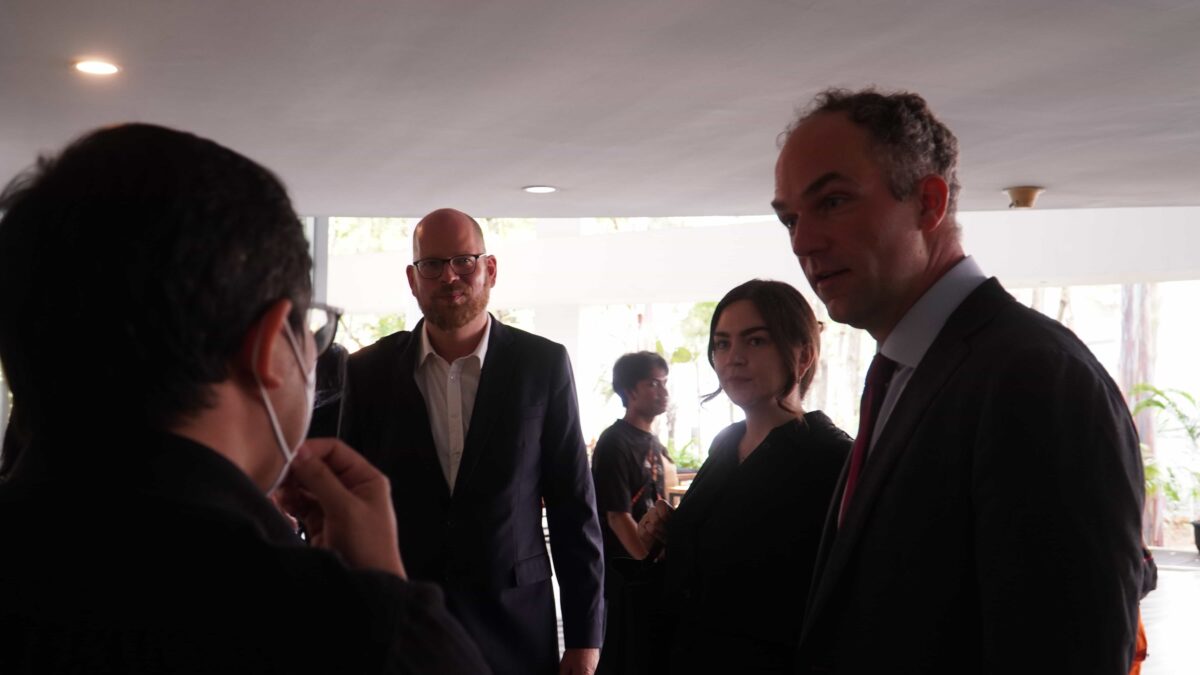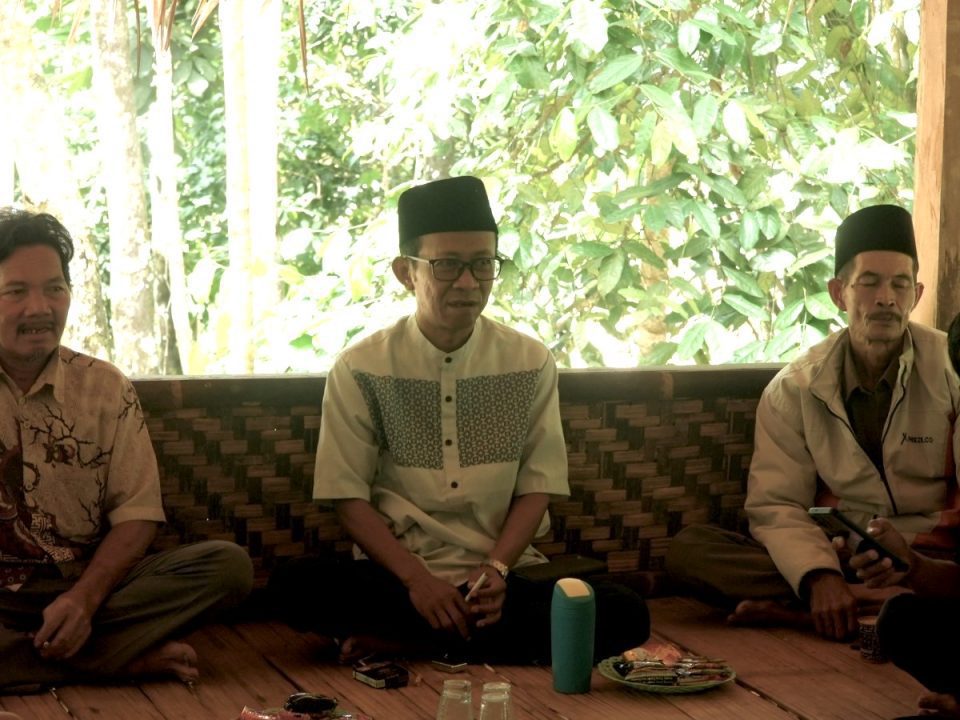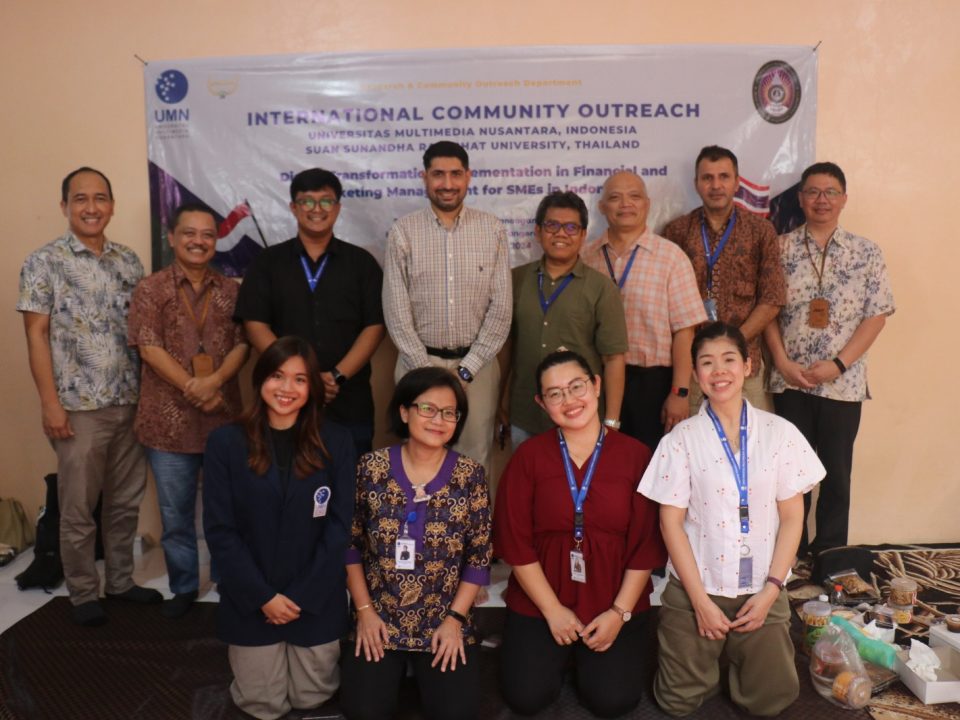Collaborating with NGOs to Address SDG Challenges
December 14, 2023Measurement of Student’s Sustainability Literacy, Understanding Rooms for Improvement
December 15, 2023
Three representatives from the German Embassy Jakarta visited the UMN campus and talked about Artificial Intelligence. (Doc. Marketing Communications UMN)
TANGERANG – The Multimedia Nusantara University (Universitas Multimedia Nusantara/UMN) Engineering and Informatics Faculty invited the German Embassy Jakarta to discuss Artificial Intelligence (AI) in the Ethical Engineering course. The meeting was done offline at the UMN campus on Monday (11/12/23).
Three representatives from the German Embassy Jakarta visited UMN, namely, Marc Lendermann (Head of Division/Director of International Digital Policy for Digitalization and Infrastructure), Celine Becker (Project Leader for German-Indonesian Digital Dialogue), and Jan Groschoff (Economics Department).
In this meeting, Lendermann led the discussion. He started the discussion by discussing AI’s challenges and the AI ACT. According to a press release by the European Council of the EU, the draft regulation aims to ensure that AI systems placed on the European market and used in the EU are safe and respect fundamental rights and EU values. This landmark proposal also aims to stimulate investment and innovation in AI in Europe.
The Issue of Artificial Intelligence and Intellectual Property

UMN Ethical Engineering students. (Doc. Marketing Communications UMN)
One aspect of the AI ACT shared by Lendermann is regarding copyright. He shared that with the AI ACT, companies that use AI must be transparent about how these systems have been developed.
“Some rules are saying that the companies need to provide detailed reports on the data or the material that has been used to train the systems. So, the authors of that material– those who made pictures, who wrote the text or made videos or audio, they can see whether the material that they have copyright on has been used to train the system,” Lendermann explained.
Lendermann added that regardless, there are still more unanswered questions– like how detailed the information should be? To what degree must companies provide information? There is still some uncertainty that we hope will be answered soon.
Copyright and intellectual property is a big issue concerning AI, specifically art-related like images, videos, music, etc. Many artists have now taken to social media and even court as they believe their copyrighted art has been used to train generative AI. You can read more about AI and intellectual property here.
There is Still a Shortage of Skilled AI Talents

Marc Lendermann, Jan Groschoff, and Celine Becker touring the UMN campus. (Doc. Marketing Communications UMN)
Another challenge in AI is the need for more skilled AI talents. There are many good researchers and leading institutions in the field of AI, but there is a shortage of people in the workforce with sufficient training for AI.
“One of the challenges for us is to upskill our workforce by providing training and another is for us to bring in people from abroad that have the talent that we need that can work in universities and companies, and can contribute to our domestic AI ecosystem. So there is a lot of room for potential cooperation among countries,” Lendermann said.
There are no borders when it comes to AI. People exchange information across borders. Hence, it is important to establish an international governance for AI. Lendermann shared that there are currently different processes and plans that aim to do so.
One example is the summit in Delhi, India, called the Global Publisher of Artificial Intelligence (GPA). This is a forum where more than 20 countries coordinate with each other concerning questions on AI, how to regulate it, and how to address it.
“AI is one of the fastest growing technologies that attract widespread adoption and it’s challenging for policymakers to keep track and for international AI dialogue to play an important role. Therefore, we are delighted to have the German-Indonesian industry dialogue where we can discuss these topics in governments,” Lendermann said. He also wishes both countries to be able to cooperate and learn from each other.
The Future of Artificial Intelligence: AI Will Not Replace Jobs

Marc Lendermann and UMN Engineering and Informatics Faculty Dean Nikki Prastomo. (Doc. Marketing Communications UMN)
“The fear that AI is going to replace jobs is exaggerated,” Lendermann said, talking about the future of AI. It is hard to predict the exact future of AI as it is rapidly developing, but it will not replace workers but help them become more productive.
He also shared a study by the International Labour Organization, an organization under the umbrella of the United Nations based out of Geneva and Switzerland. The study found that AI is not going to replace jobs.
“It will help workers get rid of routine work and help them focus on work that requires intellectual work that really requires thinking. So, according to recent research, it is fair to assume that AI will not make jobs disappear, but it will change how we work. This is one of the clearest things we can predict at the moment,” Lendermann said.
The meeting ended with a quick Q&A session between Lendermann and UMN Engineering and Informatics students. We hope this discussion will help students understand AI better and encourage students to help shape the future of AI!
By Levina Chrestella Theodora | UMN News Service
English translation by Levina Chrestella Theodora
Kuliah di Jakarta untuk jurusan program studi Informatika| Sistem Informasi | Teknik Komputer | Teknik Elektro | Teknik Fisika | Akuntansi | Manajemen| Komunikasi Strategis | Jurnalistik | Desain Komunikasi Visual | Film dan Animasi | Arsitektur | D3 Perhotelan , di Universitas Multimedia Nusantara. www.umn.ac.id





